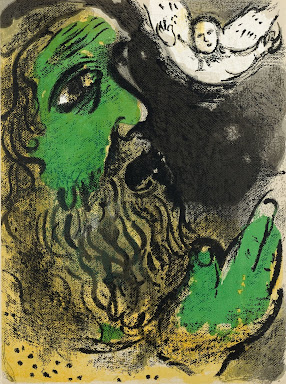Rosh Hashanah and the Akedah: Where was Sarah?
The Akedah: And Sarah tested God
By Adi Cangado
Abram took to himself a wife,
her name
being Sarai.
Now Sarai was barren,
she had no child.
From Ur of the Chaldeans
for the land of Canaan
she set out,
but when she had come as far as Haran,
she settled there, in the tent.
God appeared to Abram,
they talk time and time again.
And where is Sarai?
There, in the tent.
She had no child.
She went forth from her native land,
from her father's house,
from Haran as far as Shechem,
from there to east of Bethel,
then toward the Negeb.
“What a beautiful woman
you are!”,
Abram said to his wife
Sarai, “because of you, I may remain alive”.
But she had no child.
There was a famine in the land,
and they went down to Egypt.
“Please say that you are my sister”,
he said.
So she played the sister.
From Egypt, she went up into the Negeb,
from the Negeb as far as Bethel,
“Here is where I used to stay”,
Sarai said,
“in the tent”.
Now Sarai was barren, she had no child.
“Perhaps I shall have a child
through my maid”,
Sarai said to Abram.
Va-yishmah Avram le-kol Sarai.
Some time afterward,
her maid conceived. “The child in my womb
is mine”, her maid said.
Then Sarai treated her harshly,
and she ran away.
God appeared to Abram again,
He never speaks to her.
But she likes listening at the entrance
of the tent.
Sarah, not Sarai, shall be her name.
That morning, she would never forget,
while she was kneading and making cakes,
Sarah listened at the entrance
of the tent, a man saying
“Sarah shall have a child!”
She laughed, she laughed and laughed to herself.
“Shall I in truth bear a child,
old as I am?”
Sarah lied, saying, “I did not laugh”,
but Abraham replied, “You did laugh at yourself”.
They journeyed from there to the Negeb,
and settled between Kadesh and Shur.
Abraham was frightened,
so she had to play the sister again:
“He is my brother too”.
As He had promised, God took note
of Sarah,
and she conceived and bore a son
in her old age.
Now Sarah has a child.
“Who would have said to Abraham
that Sarah would suckle children!
Yet I have borne a son in his old age.”
And she added,
"old as I am”.
But it came to pass after these things,
that God tested Abraham and Sarah tested God.
“Take Sarah's child, Isaac, whom you love”,
He said, “and offer him as a burnt
offering.”
Where was Sarah? Listening
at the entrance of the tent.
She wept and prayed in her heart,
her voice could not be heard,
but no voice is left unheard.
Sarah lied, saying, “I did not cry”,
but Abraham replied, “You did cry”.
“Do not raise your hand against the child”,
she added, “or do anything to him.
You won't withhold my son, Isaac, from me”.
God tested Abraham
and Sarah tested God.
But early next morning,
when she woke up, there was nobody there.
“Where is the child? Where is the child?”
Do not say that something cannot be heard,
for in the end it will be heard.
God heeded the cry of a mother
and Abraham heard the voice of a wife
in his heart.
But she was weary with groaning,
every night she drenched her bed,
melted her couch in tears,
until she died,
until she died.
The sound of the shofar can be a call to live, to love,
but also to kill, to harm.
It reminds us that some times divine voices collide,
and that in such difficult challenges,
a great mitzvah is to choose life.
There are ropes we shall never walk along,
there are borders we shall never reach across,
in those places, religious vision can kill and harm,
and if not, at least somebody is surely going to be hurt.
Let us remember that.


